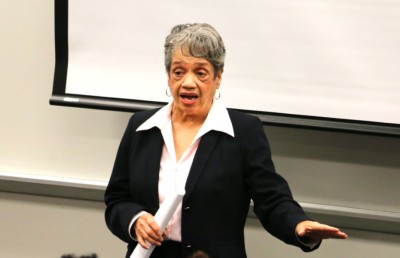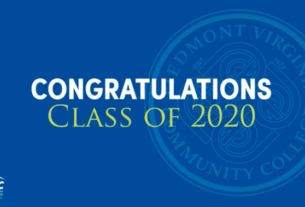
Dr. Christine Darden visits PVCC One Book Program
Ray Petree III, staff writer

In conjunction with the One Book Program, a collegiate event that encourages students and faculty to read the same book to generate conversation across the college, Doctor Christine Darden, a NASA scientist documented in the 2016 book Hidden Figures: The True Story of Four Black Women and the Space Race, visited PVCC on Nov. 15, to discuss her experiences as a student and an employee at NASA.
Dr. Darden joined NASA in 1967, but she discovered her love for math in her senior year at a boarding school in Asheville, North Carolina, while she was taking a Geometry class. She said, the key to success is her “P^4 Formula,” requiring the ability to perceive, plan, prepare, and persist.
After she graduated high school, she continued her education at Hampton University, majoring in math despite the fact that Geometry was the highest level math she had completed in high school. While her father eventually pushed her to pursue teaching to ensure her chances of securing a job after college, Darden earned her master’s while working in a research position at Virginia State University and acquired the credentials necessary to work Langley Research Center as one of the famed human computers.
Though Darden joined NASA in the late-60s more than a decade after Katherine Johnson, Mary Jackson, and Dorothy Vaughn, she realized how integral their journeys were to her career once she began speaking with the author of Hidden Figures, Margot Lee Shetterly, in preparation for the book.
“I really do believe I stood on their shoulders,” she said. “If it weren’t for their perseverance, I’m not entirely sure my position would have been available.”

As Darden’s career with NASA progressed, it became apparent to her that the female computers were trapped under the proverbial glass ceiling that women have traditionally faced. While the male employees with equal, or even inferior, credentials were awarded promotions and climbed the career ladder, women routinely had no chance for vertical growth.
After the moon landing, NASA underwent severe budget cuts, which subsequently resulted in layoffs. This led her to speak with her director about the possibility of a promotion, in fear of losing her job if she remained at the same position.
“I said, ‘I’d like to know why men and women coming in with the same backgrounds are assigned to such different jobs?’” Darden told the audience of dozens of students and staff packed in the Main Building Auditorium, recalling a conversation she had with her director. “He said, ‘Well, no one’s ever asked that question before.’ I said, ‘Well, I’m asking it now.’”
That conversation thrust her into a team at Langley, tasked with reducing the amount of sonic boom generated from supersonic flight. And after decades of creating models and testing them in air chambers, her team finally ran a successful test flight in 2002, redesigning a standard Air Force jet that flew over the Mojave Desert.
“I was not in the room that day, but a friend of mine called me, and you could hear cheering, like in the movie when John Glenn called back from the moon,” Darden said regarding the 2002 test flight.
Just recently Darden was thrilled to hear that NASA had finally received the funding to produce a functioning “low-boom” plane, building off of her team’s success in 2002, that will hopefully be completed in 2021.
Since the release of Margot Lee Shetterly’s book, chronicling her and her predecessors’ journey overcoming the difficulties that they faced being African-American women in a male dominated field, Dr. Darden has spent her time traveling to campuses across the country, telling students her story. “People always ask me about mentors, but you’ve got supervisors or teachers right here, and everytime they talk to you, they’re giving you advice. They’re mentoring you whether you know it or not,” she said.
When asked if she had any other advice for college students, Darden said, “Remember that to employers you’re an asset. So make yourself an asset worth investing in.”






